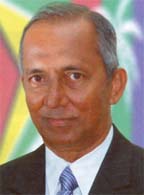-after intense Parliament debate
The National Assembly yesterday passed a constitutional amendment to set up the long-awaited security sector oversight committee, with responsibility for the policies and administration of the disciplined forces.
The passage of the Constitution (Amendment) Bill 2009 will pave the way for the establishment of the Parliamentary Oversight Committee on the Security Sector, in keeping with an agreement made last March by National Stakeholders after consultations on security following two bloody massacres. After a minor hiccup, the Bill was passed with an amendment proposed by the AFC to allow the oversight committee to “co-opt” experts who are not members of the National Assembly, making it only the second parliamentary committee after the Standing Committee on Constitutional Reform that can co-opt non MPs to assist in its work.

The main opposition PNCR-1G sought a deferral of the passage of the Bill, in order for more consideration of the framework of the legislation, but government speakers argued that there had been enough time already for deliberation. The PNCR-1G’s spokesmen, Winston Murray and party leader Robert Corbin, both indicated support for the setting up of a security sector oversight committee, but they expressed concern to the Assembly that the Bill strayed from the intent of the National Stakeholders agreement by limiting the committee’s scope. They also argued against the propriety of allowing a government minister to chair the committee. Two amendments proposed by the party were defeated by the government.
Before he was given a glowing tribute-filled send off, retiring Attorney General Doodnauth Singh, in his final sitting, piloted the Bill through its final stages, urging unanimity. He thought that concerns about the committee’s terms of reference-raised by some opposition speakers-was premature and irrelevant to the debate since a subsequent motion would be tabled. Given that the Bill has been in circulation since 2008 and the urgency with which matters of security ought to be considered, Singh reminded the Assembly of the maxim coined by former Chancellor J.O.F Haynes, who said it is better to attempt to achieve rather than to seek to set aside.
However, Murray told the Assembly that the PNCR-1G believed that every effort should be made to achieve what the people expect and as a result he appealed for a deferral to reach agreement on the functioning of the committee. He noted that there had been progress among the parties at the level of the Parliamentary Management Committee (PMC), where agreements were made on the committee’s composition, the privacy of its meetings and even swearing its members to secrecy. However, the PMC reached no agreement on chairmanship of the committee as well as the question of its scope.

On the former issue, Murray explained that the government insisted on chairmanship being given to a government minister, a position that opposition had strong reservations about. He said the PNCR-1G believed that no minister should chair the committee, since it is intended that the legislative branch have oversight over the executive branch of government. Further, he said that it would be “reprehensible” and “preposterous” to ask members of the executive to chair given the government’s policy of collective responsibility. “In the interest of accountability it would not be proper to have a minister,” he said.
Murray also drew attention to the recommendation of the National Stakeholders stipulating a standing sectoral committee, albeit one with ministerial representation. Sectoral committees have responsibility for the scrutiny of all areas of government policy and administration and the chair and deputy chair are elected from opposite sides of the Assembly. In this vein, Murray accused the government of having a “change of heart” on the issue and going ahead to define a framework without referring back to the stakeholders, which he said would have been the proper thing to do. “The government is trying to make significant changes that depart from the clear intentions of the National Stakeholder’s Forum,” he said. Murray added that the stakeholders intended a broad remit for the committee, while the government’s proposed framework whittling it down to the disciplined forces. He, however, reminded that the country was born with an overarching national security problem, citing the Venezuelan land claim. The PNCR-1G’s amendments sought to orient the committee in keeping with sectoral committee provisions.
Meanwhile, PPP/C MP Gail Teixeira also calling for support from the PNCR-1G, said the decision to proceed with the Bill was taken since last November but no attempt was made by the party to address the outstanding areas of contention. She noted that the committee is a first among Caricom countries and rare one in the Commonwealth. Teixeira added that the parties need to build trust on many levels before they could move forward and she said that a draft motion dealing with the terms of reference in circulation since last year would be presented to the Assembly. Home Affairs Minister Clement Rohee, who accused the PNCR-1G of attempting to score cheap political points, said the committee would ensure greater accountability by the disciplined forces by virtue of greater supervision.
During the debate, it was noted that an oversight committee for national security had been recommended around a decade ago, with several variations proposed over the years. The most recent have been the recommendations made in the Disciplined Forces Commission report, the UK-funded Security Sector Reform Action Plan and the National Stakeholders Forum. AFC MP Raphael Trotman, who successfully moved the amendment to allow for the co-opting of non MPs by the committee, recorded his party’s support for the oversight committee. He also noted that the setting up of the committee is an essential precondition to accessing aid under the plan.
Trotman admitted that few governments in the world would hand over oversight to persons outside of its purview. He added that the AFC believes that trust has to be built and that the process has started. But he noted that it starts and stalls too often, and in particular only in times of crisis. “There is no need to keep distrusting,” he said. “If we are like that we will never begin trusting…”
Though he regretted that it took almost a year to get to the House, he said, “We give our support,” adding that the success of the committee would, however, be in its terms of reference. In this regard, he urged that in addition to looking at the disciplined forces, the committee would also look at their welfare.
Trotman also urged that civil society be involved in the work of the committee, saying that its support would be critical. As a result, he moved the amendment to allow the committee to co-opt experts or enlist the aid of other persons of appropriate expertise, whether or not they are MPs. As the Bill was being considered in committee stage, Rohee sought to have the term “co-opt” changed to “engage,” without informing Trotman. Rohee eventually recanted when Trotman then threatened to withdraw his amendment.
Other speakers on the Bill included Corbin, GAP-ROAR’s Everall Franklin and PPP/C MPs Donald Ramotar and Manzoor Nadir.





